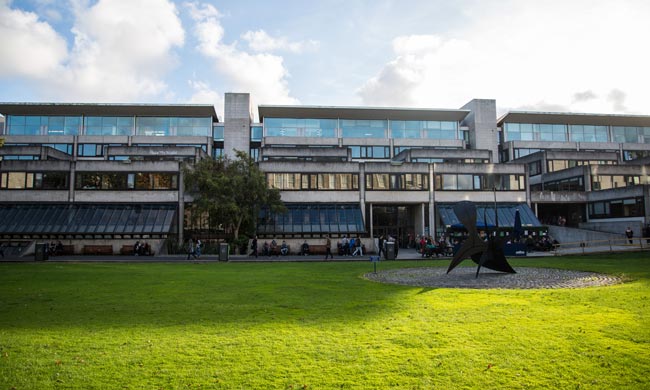As next year’s batch of potential undergraduates streamed into college on Saturday for the 2017 Open Day, the first course presented to them in Trinity’s shiny new prospectus was TSM. Replete with difficult-to-decipher pattern combination grids, numerous asterisks and annotations, and a finicky CAO code system, the double-page spread neatly exemplifies the many confusions associated with today’s convoluted TSM programme.
Currently offering 26 subjects and 183 possible combinations, TSM is by far Trinity’s most diverse, as well as the most-difficult-to-wrap-your-head-around, entry route. It’s no surprise, then, that the programme is currently undergoing an overhaul, being “refreshed and redeveloped” towards a “single common model”, in line with the strategies of the Trinity Education Project.
While the possibility of studying two subjects and combining them with reasonable discretion is undoubtedly a good thing, as it stands, there’s ample room for improvement and many a crease in need of ironing out. Noticeable omissions from the present TSM portfolio include business, law and political science. Confusingly, on offer instead is a random smattering of independent but TSM-like courses, such as history and politics. While such courses seem likely to be made relics in the near future – due to ongoing efforts to reduce the number of course codes, similar options, such as philosophy and politics, have already been discontinued – Trinity has also confirmed that new subjects won’t be introduced to the programme until at least the 2020/21 academic year. Perhaps unsurprisingly, much-needed change looks set to be slow.
Subject exclusions aren’t the only questionable feature of the present TSM format. Despite the vast number of pattern possibilities, there remains a certain rigidity to the programme. Two subjects isn’t a lot, especially when we consider the success and popularity of multidisciplinary options like philosophy, politics, economics and sociology (PPES) and BESS. For young people coming straight from the Leaving Certificate, where they’ve studied a minimum of six subjects, such diverse courses offer reassurance and wiggle room. Four years is a long time, and committing to one or two subjects at such a young age can be something of a shot in the dark.
Given this, it’s no coincidence that Ireland’s most popular course is arts in University College Dublin (UCD), a highly flexible programme that offers new electives each semester, giving individuals the freedom to really shape the direction of their degree. Meanwhile, in Maynooth University, arts students can pick up to four subjects in their first year.
Despite the potential appeal of such broad programmes, it’s unlikely that Trinity will follow suit. The most recent review of TSM recommended avoiding the path of these generalised arts degrees. Instead, Trinity, conscious of the ever-increasing need for flexibility in today’s world, will introduce electives as part of Trinity Education Project, allowing all students to extend the scope of their studies beyond just one or two subjects.
One thing that is clear, however, is that this new structure needs to be characterised by greater clarity and coherence than what is currently on offer.
How these electives might be integrated with or complement the replacement TSM programme isn’t apparent yet. One thing that is clear, however, is that this new structure needs to be characterised by greater clarity and coherence than what is currently on offer.
An effective joint honours programme is an invaluable asset to a university, and the possibility of studying several subjects concurrently has growing appeal for incoming students, who are no doubt keenly aware of the unpredictable working world they will tumble into after university.
For arts and humanities graduates in particular, it’s long been tacitly acknowledged that the skills considered most useful, at least on the job market, are those gained not from the content of courses – the novels read or social theory expounded – but the “soft” skills, such as the ability to think critically, solve problems and be adaptable in the face of unexpected challenges. Studying more than one subject at once fosters such a mindset, enabling students to understand concepts more comprehensively and discern patterns across a variety of fields.
Increasingly, we are seeing the merits, and indeed the inevitability, of moving away from a model of industrialisation whereby the working world is analogous to a factory, with employees neatly boxed off into specific roles. Whirlwind growth and societal change that far outpaces our education system demands versatile minds. Employability aside, the modern world presents us with problems in dire need of creative solutions, and being able to step back and see the wider picture, draw from multiple perspectives and approach things in unique ways, is absolutely fundamental. This makes it more crucial than ever that Trinity gets its flagship dual-degree programme right.
Employability aside, the modern world presents us with problems in dire need of creative solutions, and being able to step back and see the wider picture, draw from multiple perspectives and approach things in unique ways, is absolutely fundamental.
Such a large programme spanning multiple schools and departments is obviously a challenge for the College to facilitate and manage, hence the slow progress. Plans to change TSM have been in place for a long time, and now it looks as if it’ll be at least 2021 before we see the final facelift staff and students have long been striving for. Let’s hope that when the new programme eventually arrives, it provides students with the confidence and integrity that’s sorely needed.







